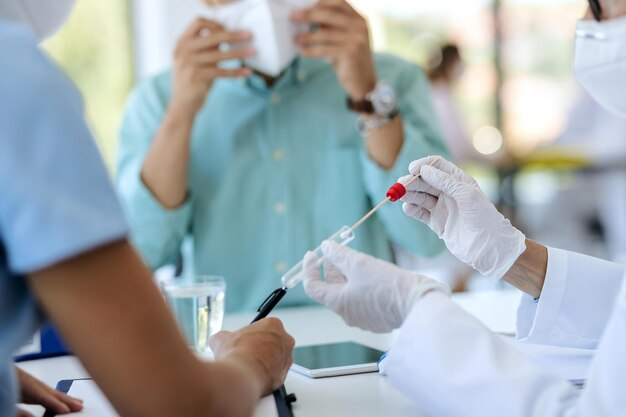Working as a phlebotomist in the United Kingdom can be incredibly demanding, with varying degrees of responsibility and stress depending on where you work. From ensuring samples are collected correctly to dealing efficiently with requests for special testing services, each individual must have a thorough understanding of their role and all associated requirements.
In this blog post, we’ll explore how demanding life as a phlebotomist is, analysing different levels of skill required from differing roles within the profession along with going through any additional stresses which could come your way should you choose to pursue phlebotomy. Read on to find out more!
Overview of the UK Phlebotomy Profession
The UK Phlebotomy profession involves skilled and trained healthcare professionals who specialize in drawing blood samples from patients. Phlebotomists play a crucial role in diagnosing and treating various medical conditions. To become a phlebotomist, one needs to undergo specialized training that includes both theoretical and practical components. London offers some of the best phlebotomy training London programs in the UK.
These training courses equip students with the necessary skills to collect, handle, and process blood samples, while also teaching them vital problem-solving and communication skills. With a growing demand for phlebotomists in the healthcare industry, pursuing a career in this field can be a smart move for aspiring healthcare professionals.
Why Demand for Phlebotomists is Increasing
As the healthcare industry continues to grow at a rapid pace, the demand for phlebotomists is on the rise. These medical professionals, also known as venipuncturists, play an essential role in diagnosing and treating patients by drawing blood samples for laboratory testing. With advances in medical technology and an increase in preventative care, the need for skilled phlebotomists has never been greater.
Moreover, an ageing population that requires ongoing medical attention further contributes to the demand for these professionals. The growing demand for phlebotomists means more job opportunities and career growth in the healthcare industry, making it an exciting time to consider a career in this field.
Education Requirements for Becoming a Phlebotomist
If you’re interested in pursuing a career as a phlebotomist, there are certain education requirements you’ll need to meet. To practice phlebotomy, you’ll typically need a high school diploma or equivalent, and a post-secondary certificate from an accredited phlebotomy program. Most programs take about 4-8 months to complete and cover topics like anatomy and physiology, medical terminology, and blood collection techniques.
These training courses equip students with the necessary skills to collect, handle, and process blood samples, while also teaching them vital problem-solving and communication skills. With a growing demand for phlebotomists in the healthcare industry, pursuing a career in this field can be a smart move for aspiring healthcare professionals.
In addition to completing an accredited program, you may also need to pass a certification exam to become a certified phlebotomist, depending on your state’s requirements. While the education requirements for phlebotomy may seem daunting, the field is known for offering a stable career path with plenty of opportunities for advancement.
Types of Blood Samples Analyzed by Phlebotomists
Phlebotomists play a crucial role in our healthcare system by drawing blood and preparing samples for lab analysis. They are responsible for collecting and handling different types of blood samples, which can vary depending on the specific medical test or diagnostic procedure ordered by a physician. These blood samples include venous blood, arterial blood, capillary blood, and micro samples.
Each type of sample presents its unique challenges and requires specialized techniques and equipment to obtain accurate and reliable results. By carefully collecting and analyzing these blood samples, phlebotomists help healthcare providers make informed decisions about patient care and treatment.
Specialized Skills and Knowledge Needed to be a Phlebotomist
A phlebotomist is an important member of the healthcare team, responsible for drawing blood from patients for diagnostic testing or blood donations. To become a phlebotomist, specialized skills and knowledge are necessary to confidently and safely perform the job. These skills include a deep understanding of human anatomy and physiology, the ability to properly and effectively communicate with patients, and expertise in using tools such as needles, tourniquets, and blood collection tubes.
These training courses equip students with the necessary skills to collect, handle, and process blood samples, while also teaching them vital problem-solving and communication skills. With a growing demand for phlebotomists in the healthcare industry, pursuing a career in this field can be a smart move for aspiring healthcare professionals.
Additionally, phlebotomists need to be detail-oriented to ensure accurate labelling, handling, and processing of blood specimens. With these specialized skills and knowledge, phlebotomists play an integral role in supporting healthcare providers in their quest to diagnose, prevent, and treat illnesses.
Benefits of Working as a Phlebotomist in the UK
Working as a phlebotomist in the UK can be a rewarding experience that offers a range of benefits. For one, it is a fast-growing field, meaning that employment opportunities are continually expanding. Moreover, phlebotomists make a significant contribution to patients’ health outcomes by collecting blood samples that are critical for accurate diagnosis and treatment. Additionally, the job provides a sense of fulfilment as one directly helps people alleviate their ailments and sicknesses.
Phlebotomists also have the opportunity to work in various settings, including hospitals, labs, and clinics, allowing for diverse experiences and career growth. Finally, the pay and benefits are competitive, with opportunities for advancement. All in all, working as a phlebotomist in the UK is a viable option for those seeking a fulfilling and stable healthcare career.
Conclusion
Becoming a phlebotomist in the UK can be a rewarding career, with high demand and diverse tasks. However, it requires specific education, skills and knowledge to earn a license. Despite the benefits of stable employment and valuable laboratory experience, challenges such as overtime work and managing difficult situations with patients may arise. Aspiring healthcare professionals should consult with industry veterans before committing to training for this speciality. Visit our website for comprehensive information on how to become a licensed phlebotomist in the UK.
These training courses equip students with the necessary skills to collect, handle, and process blood samples, while also teaching them vital problem-solving and communication skills. With a growing demand for phlebotomists in the healthcare industry, pursuing a career in this field can be a smart move for aspiring healthcare professionals. Read more here and Thank you!













